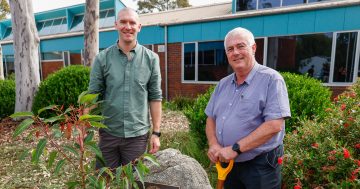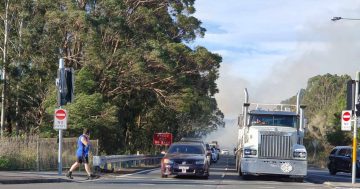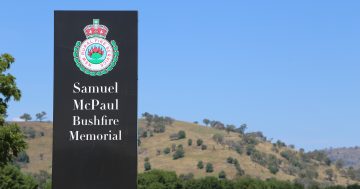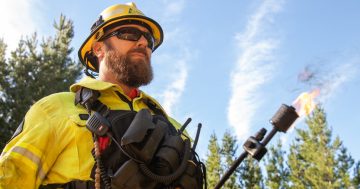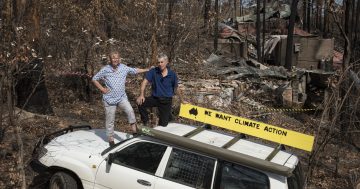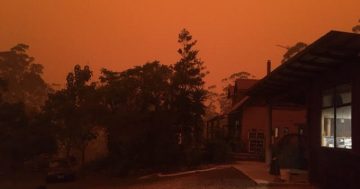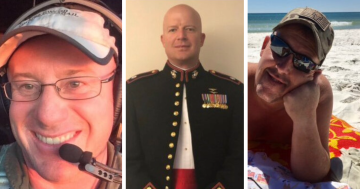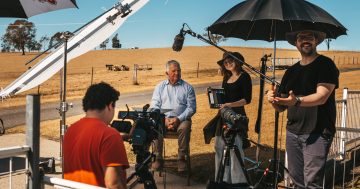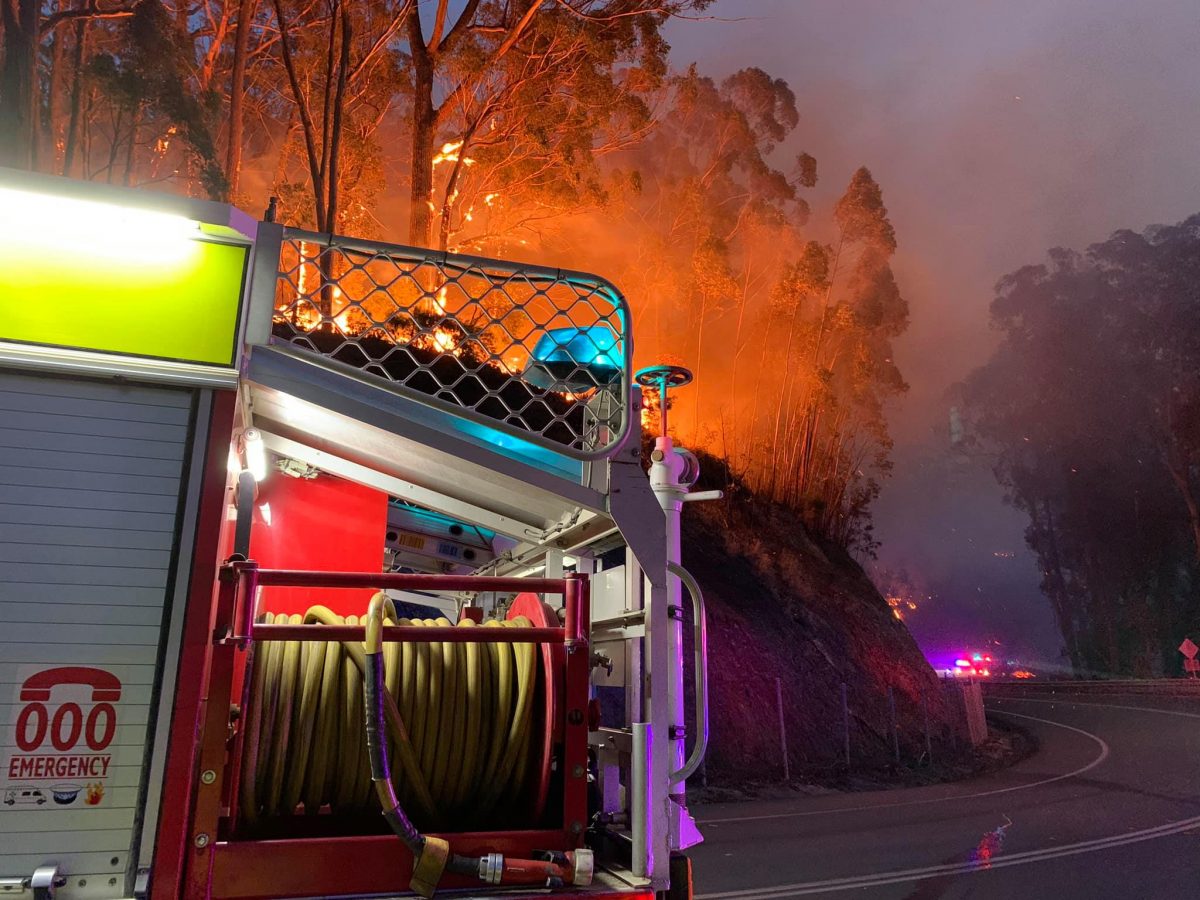
The Currowan Fire near Government Bend. Photo: Queanbeyan Fire and Rescue.
Early summer 2019. Drought had an iron grip on the cracking land.
The heat was palpable, hard, ominous. Fires took hold up north. We watched and waited.
On a Sunday night, the first real alarms flickered for our region as the Currowan fire erupted north of Durras. On Monday morning, it crossed the highway. Ahead of us was the hell that would become the Black Summer.
These were the worst times of my 35-year career in journalism. Five years on, emotion floods to the surface swiftly. So much suffering, so much destruction. For week after endless week, we lived through an apocalypse.
It’s hard to know where to begin. The choking yellow smoke, the days of making global news for the world’s worst air quality, the constant reporting, catching the RFS, the BOM, and the ESA for on-the-ground information, trying to be of real use to locals.
Braidwood was threatened before Christmas. I remember broadcasting via Facebook at 9 o’clock at night with the fire a few hundred metres from the town’s outskirts. Walking into Tilley’s a day or two later I saw a friend, evacuated from there, who burst into tears and hugged me like her arms would break.
On New Year’s Eve 2019, the sun did not rise on the coast. With crystal clarity, I can still hear Region journalist Lisa Herbert telling me: “Gen, Cobargo is on fire. The whole town is on fire.”
Mogo burned, the zoo surrounded by roaring flames as staff sheltered animals in their own homes.
At Batemans Bay and Rosedale, at Broulee and Malua Bay, people fled, huddling on beaches. The fires joined and grew into a monstrous beast, its size beyond anyone’s stories or imaginings. It felt like the whole world was on fire.
Emergency centres at ovals and showgrounds filled. Highways closed. There was no food, no petrol, no power and little water for days. There was not a tampon or disposable nappy to be had on the coast, a friend said.
An urgent RFS call went out to media. “Please help us reach people in Bermagui – we’re not sure we can save it.” The same, later, for Eden and Pambula. All those gentle places, redolent of long summers on quiet beaches, were ringed with flames. Moruya was circled again and again.
I can’t forget speaking to a woman who’d driven through hell on earth, fleeing her supposedly fire-proof, well-prepared home.
“The roaring was indescribable; the road was full of falling branches and terrified animals, and I thought we were surely going to die,” she said to me.
I can’t forget the woman who didn’t have room for her last, beloved, elderly horse on the float. She shot him instead of leaving him to burn.
I can’t forget the Region journalist who went out after the fire’s grim passage, helping find and euthanise badly injured wallabies and kangaroos.
I respected her greatly because I can’t bear, then or now, to think about the animals. I knew there’d be help for the people, but I couldn’t let the terrified, burning animals into my mind, an uncrossable line when we had to keep reporting.
In Canberra, the state of emergency hovered for weeks at catastrophic risk levels. As Namadgi was consumed by the Orroral fire, Ngunnawal elders were helicoptered in to retrieve precious women’s artefacts.
We heard about mega blazes as the Dunns Rd fire roared through Batlow and Tumbarumba, and the Clear Range fire ignited the very air between Bredbo and Michelago.
I remember, vividly, driving the Cotter Rd and saying out loud to the orange sky, “Make it stop. Dear God, make it stop. This is too hard to bear”.
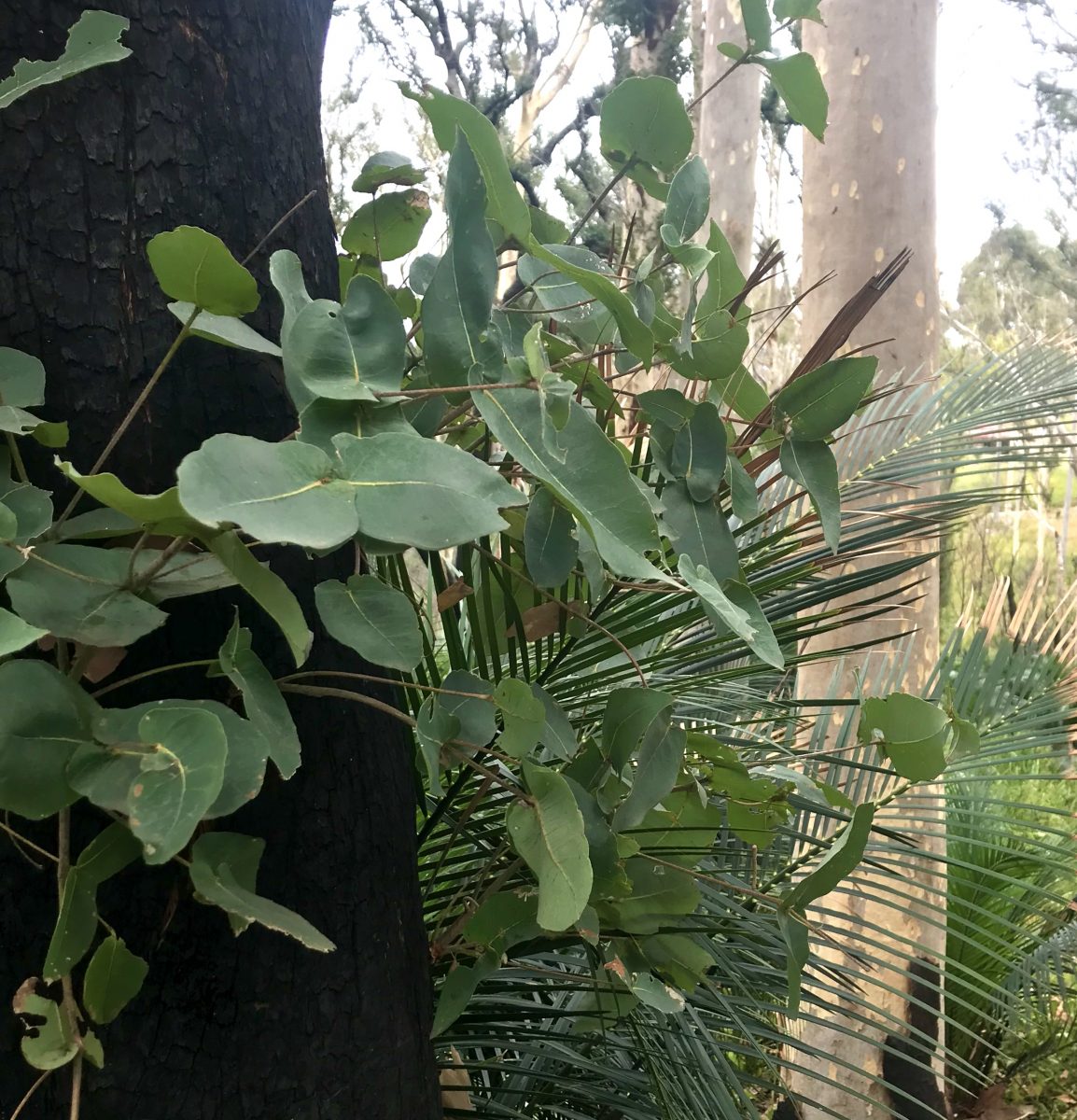
Epicormic growth on fire-ravaged trees. Photo: Genevieve Jacobs.
The rains of February 2020 truly represented grace. Soaking rain coaxed forth epicormic fringes of furry, brilliant green on blackened trees.
When I first drove back over the Clyde, I wept for the deep cool gullies, the canopies of tree fern that are gone, irrevocably changed.
But so are we all, in many ways.
By summer’s end, 33 people had died, more than 3000 homes had been destroyed, and 17 million hectares burned. To this day, people are displaced, scarred and battling their demons.
Human bravery and goodness came to the rescue over and over again. We saw immense acts of compassion during the disaster and the long months that followed, while COVID took over the news and we were forgotten by the world.
As scientists tell us, extreme weather makes fires ever more likely, but many things have changed: tough new building regulations, resilience training in threatened communities, proliferating weeds, and regrowth in the scarred bush.
And all we can cling to is hope that it will never be like this again.
Genevieve Jacobs was group editor of Region during the Black Summer.
Original Article published by Genevieve Jacobs on Riotact.







